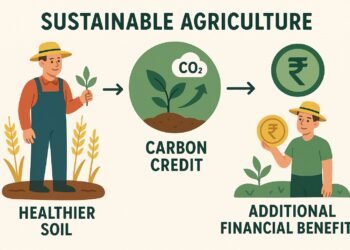Environmental impacts responsible for almost one quarter of all deaths, highlighting need to place environment at heart of efforts to improve human health
India CSR News Network
NAIROBI: Environmental degradation and pollution is estimated to cause up to 234 times as many premature deaths as occur in conflicts annually, highlighting the importance of a healthy environment to achieving the 2030 Agenda for Sustainable Development, according to a new report released at the second United Nations Environment Assembly (UNEA-2).
 Environmental impacts are responsible for the deaths of more than one quarter of all children under the age of five, the report states.
Environmental impacts are responsible for the deaths of more than one quarter of all children under the age of five, the report states.
Healthy Environment, Healthy People – published by the United Nations Environment Programme (UNEP), the World Health Organization (WHO), the Convention on Biological Diversity, the Montreal Protocol on substances that deplete the ozone layer, and the Basel, Rotterdam and Stockholm conventions – looks at the dangers posed by air pollution, chemicals, climate change and other issues linking environmental quality to human health and well-being.
UNEP Executive Director Achim Steiner said, “By depleting the ecological infrastructure of our planet and increasing our pollution footprint, we incur an ever-growing cost in terms of human health and well-being. From air pollution and chemical exposure to the mining of our natural resource base, we have compromised our life support systems.
“A healthier planet is a rising tide that lifts all boats, including human health, but also economies and societies. By grounding development and progress in environmental health, we safeguard our own well-being. At UNEA-2, the world is focusing on pathways to ensure that the environment sustains human health rather than threatening it.”
The report finds that in 2012, an estimated 12.6 million deaths were attributable to deteriorating environment conditions, or 23 per cent of the total.
The highest proportion of deaths attributable to the environment occurs in South-East Asia and in the Western Pacific (respectively 28 per cent and 27 per cent of the total burden). The number of deaths attributable to the environment is 23 per cent in sub-Saharan Africa, 22 per cent in the Eastern Mediterranean region, 11 per cent and 15 per cent in the Organisation for Economic Co-Operation and Development (OECD) and non-OECD countries of the Americas region, and 15 per cent in Europe.
Deaths related to non-communicable diseases related deaths are rising in all regions: three quarters of people who died from non-communicable diseases in 2012 lived in low and middle income countries.
The report also points to the drivers of the environmental health-related impacts – including ecosystem disruption, climate change, inequality, unplanned urbanization, unhealthy and wasteful lifestyles and unsustainable consumption and production patterns – and outlines the massive health and economic benefits that action would bring.
Climate change is exacerbating the scale and intensity of environment-related health risks. Estimates from the WHO indicate that 250,000 additional deaths could occur each year between 2030 and 2050, mostly from malnutrition, malaria, diarrhoea and heat stress, as a result of climate change.
The key environmental factors highlighted in the report include:
- Air pollution, which kills 7 million people across the world each year. Of these, 4.3 million are down to household air pollution, particularly among women and young children in developing countries.
- Lack of access to clean water and sanitation, which results in 842,000 people dying from diarrhoeal diseases every year, 97 per cent of which in developing countries. Diarrhoeal diseases are the 3rd leading cause of deaths of children younger than 5, representing 20 per cent of all deaths in children under five years.
- Chemical exposure: Some 107,000 people die annually from exposure to asbestos, and 654,000 died from exposure to lead in 2010.
- Natural disasters: Since the first UN Climate Change Conference in 1995, 606,000 lives have been lost and 4.1 billion people have been injured, left homeless or in need of emergency assistance as a result of weather-related disasters.
- While outlining the problems, the report also showed how investments in a healthy environment can bring multiple benefits.
- The successful phase-out of nearly 100 ozone-depleting substances (ODS) means that up to 2 million cases of skin cancer and many millions of eye cataracts may be prevented each year by 2030 thanks to the healing ozone layer.
- Benefits from eliminating lead in gasoline on a global scale have been estimated at $2.45 trillion per year, or 4 per cent of global Gross Domestic Product (GDP), saving an estimated 1 million premature deaths per year.
- Implementing proven, cost-effective measures to reduce emissions of short-lived climate pollutants such as black carbon and methane could reduce global warming by 0.5°C by the middle of the century, and save 2.4 million lives a year from reduced air pollution by 2030.
- Investments in preventative workplace health programmes of around $18-60/worker can reduce sick leave absences by 27 per cent, while the return on investment in water and sanitation services is between $5 and $28 per dollar.
To achieve such benefits, the report recommends four integrated approaches:
- DETOXIFY: Remove harmful substances from and/or mitigate their impact on the environment in which people live and work.
- DECARBONIZE: Reduce the use of carbon fuels and thereby emissions of carbon dioxide (CO2) through renewables. Over their life-cycle, the pollution-related human health and environmental impacts of solar, wind and hydropower are 3 to 10 times lower than fossil-fuel power plants.
- DECOUPLE RESOURCE USE AND CHANGE LIFESTYLES: Generate the necessary economic activity and value to sustain the world’s population with lower resource use, less waste, less pollution and less environmental destruction.
- ENHANCE ECOSYSTEM RESILIENCE AND PROTECTION OF THE PLANET’S NATURAL SYSTEMS: Build the capacity of the environment, economies and societies to anticipate, respond to and recover from disturbances and shocks through protection and conservation of genetic diversity and terrestrial, coastal and marine biodiversity; strengthening ecosystem restoration; and reducing pressures from livestock production and logging on natural ecosystems.
Other reports released at the same time, to tie in with the focus on human health under discussion at UNEA-2, examines issues such as plastics, lead in paint and zoonotic diseases.
- Marine Plastic Debris and Microplastics: Global Lessons and Research to Inspire Action and Guide Policy Change found that in 2014, global plastic production exceeded 311 million metric tonnes, a 4 per cent increase over 2013. Between 4.8 and 12.7 million tonnes ended up in the ocean as a result of inadequate solid waste management. Microplastics are of particular concern.
One study estimated that, on average, every square kilometre of the world’s oceans has 63,320 microplastic particles floating at the surface. Marine organisms – including zooplankton, invertebrates, fishes, seabirds and whales – can be exposed to microplastics through direct ingestion of water and indirectly as predators in food webs. Potential adverse effects of microplastic ingestion include immunotoxicological responses, reproductive disruption, anomalous embryonic development, endocrine disruption, and altered gene expression.
Gender and Plastic Management looked at the differing roles of men and women in plastic use and consumption, identifying women in wealthy regions as important stakeholders in reducing plastics in basic consumer goods.
2016 Global Report on the Status of Legal Limits on Lead in Paint, meanwhile, found that efforts to tackle lead in paint are advancing. As of early 2016, 70 of 196 countries worldwide (36 per cent) had established legally binding limits on lead in paint. Most of the lead paint controls have established enforcement provisions to ensure compliance with their lead limits. However, only 17 countries required that paint be tested and certified for lead content.
UNEP Frontiers found that there has been a worldwide increase in emerging zoonotic diseases, outbreaks of epidemic zoonoses, a rise in foodborne zoonoses and a troubling persistence of neglected zoonotic diseases in poor countries.
“Never before have so many animals been kept by so many people – and never before have so many opportunities existed for pathogens to pass through the biophysical environment and wild animals to livestock and people as zoonotic diseases or zoonoses,” the report states.
About 60 per cent of all infectious diseases in humans are zoonotic, as are 75 per cent of all emerging infectious diseases.
In recent years, several emerging zoonotic diseases hit world headlines as they caused, or threatened to cause, major pandemics. In addition to bird flu, these include Rift Valley fever, sudden acute respiratory syndrome (SARS), Middle East respiratory syndrome (MERS), West Nile virus, Ebola and the Zika virus.
In the last two decades, these emerging diseases have had direct costs of more than $100 billion, the report notes. If these outbreaks had become human pandemics, the losses would have amounted to several trillion dollars.
Download full Healthy Environment, Health People report here: http://www.unep.org/about/sgb/
Download full 2016 Global Report on the Status of Legal Limits on Lead in Paint report here:
http://www.unep.org/
Download full Frontiers report here: http://web.unep.org/frontiers/




















